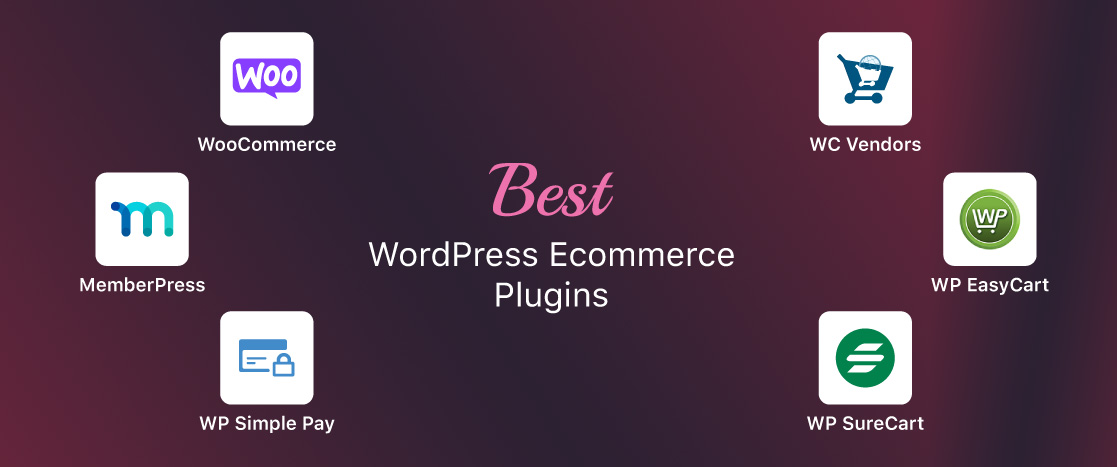
Best Guide to Ecommerce Tools for Optimizing Your Online Business
- 1. Track Your Success With Top Ecommerce Reporting Tools
- 2. Deliver Exceptional Service With Ecommerce Customer Support Tools
- 3. Boost Your Online Visibility With E-commerce SEO Tools
- 4. Maximize ROI with Ecommerce PPC Tools
- 5. Ensure Smooth Transactions With Ecommerce Payment Processors
- 6. Engage Customers With Ecommerce Email Marketing Tools
- 7. Simplify Finances With Ecommerce Accounting Tools
- 8. Enhance Customer Experience With AI Chatbots for Ecommerce
- 9. Uncover Actionable Insights With BI Tools for Ecommerce
- 10. Boost Your Social Presence With Social Media Tools for Ecommerce
- 11. Streamline Sales With Ecommerce POS Systems
- 12. Scale with Ease Using Ecommerce ERP Integration
- 13. Keep Track of Stock With Ecommerce Inventory Management Software
- 14. Help Customers Find What They Need With Ecommerce Site Search Tools
- 15. Increase Sales With Ecommerce Affiliate Marketing Tools
- 16. Build Customer Loyalty With Ecommerce Loyalty Program Tools
- 17. Optimize Shipping Costs With Ecommerce Shipping Rate Calculators
- 18. Manage Recurring Payments With Ecommerce Subscription Management Tools
- 19. Build Trust With Ecommerce Reviews and Rating Tools
- Conclusion
Running a successful ecommerce business goes beyond offering quality products. To remain competitive, it’s crucial to equip your store with the right tools that streamline operations, increase sales, and improve the customer experience. In today’s fast-paced digital landscape, a robust set of ecommerce tools can be the difference between growth and stagnation. From enhancing your site’s visibility with SEO tools to ensuring seamless transactions with payment processors, these tools provide the automation, efficiency, and insights needed to run a thriving online store.
In this comprehensive guide, we’ll explore the essential ecommerce tools across various categories—each tailored to help you elevate your business to the next level. Whether you’re a small startup or a growing enterprise, the right tools can help you optimize every aspect of your ecommerce operations.
- 1. Track Your Success With Top Ecommerce Reporting Tools
- 2. Deliver Exceptional Service With Ecommerce Customer Support Tools
- 3. Boost Your Online Visibility With E-commerce SEO Tools
- 4. Maximize ROI with Ecommerce PPC Tools
- 5. Ensure Smooth Transactions With Ecommerce Payment Processors
- 6. Engage Customers With Ecommerce Email Marketing Tools
- 7. Simplify Finances With Ecommerce Accounting Tools
- 8. Enhance Customer Experience With AI Chatbots for Ecommerce
- 9. Uncover Actionable Insights With BI Tools for Ecommerce
- 10. Boost Your Social Presence With Social Media Tools for Ecommerce
- 11. Streamline Sales With Ecommerce POS Systems
- 12. Scale with Ease Using Ecommerce ERP Integration
- 13. Keep Track of Stock With Ecommerce Inventory Management Software
- 14. Help Customers Find What They Need With Ecommerce Site Search Tools
- 15. Increase Sales With Ecommerce Affiliate Marketing Tools
- 16. Build Customer Loyalty With Ecommerce Loyalty Program Tools
- 17. Optimize Shipping Costs With Ecommerce Shipping Rate Calculators
- 18. Manage Recurring Payments With Ecommerce Subscription Management Tools
- 19. Build Trust With Ecommerce Reviews and Rating Tools
- Conclusion
1. Track Your Success With Top Ecommerce Reporting Tools
Data-driven decisions are the cornerstone of any successful ecommerce store. Ecommerce reporting tools allow you to gather insights into customer behavior, sales trends, and website performance. By providing detailed analytics, these tools help you identify what’s working and what needs improvement. Google Analytics, for example, is a popular option that offers in-depth metrics like conversion rates, traffic sources, and audience demographics. Advanced tools like Kissmetrics and Glew.io take this further, providing e-commerce-specific reports that analyze product performance and customer lifetime value. Leveraging these insights can drive better marketing strategies and operational efficiency, making reporting tools indispensable for scaling your business.
2. Deliver Exceptional Service With Ecommerce Customer Support Tools
Excellent customer support is essential for retaining customers and fostering long-term loyalty. Ecommerce customer support tools such as Zendesk and Jotform AI Agents enable businesses to provide timely, efficient, personalized support. These platforms offer multi-channel integration, allowing you to manage customer queries across email, social media, live chat, and phone from one central dashboard. By implementing automated responses and AI-driven chatbots, you can ensure that customers receive quick resolutions even during high-traffic periods. Exceptional customer service can reduce cart abandonment rates, improve satisfaction, and ultimately, boost repeat business.
3. Boost Your Online Visibility With E-commerce SEO Tools
Ranking high on search engines is crucial for driving organic traffic to your ecommerce site. SEO tools like SEMrush, Ahrefs, and Moz help you optimize your site by providing keyword insights, backlink analysis, and on-page SEO audits. These tools allow you to monitor your competitors, identify the best-performing keywords, and track changes in your search rankings. With e-commerce-specific features, they offer recommendations for improving product descriptions, category pages, and overall site structure. An optimized SEO strategy ensures that your ecommerce store is easily discoverable, increasing your chances of reaching potential customers.
4. Maximize ROI with Ecommerce PPC Tools
Pay-per-click (PPC) advertising is a powerful way to attract targeted traffic and maximize return on investment. With tools like Google Ads, AdEspresso, and WordStream, you can create, manage, and optimize your PPC campaigns. These platforms help businesses automate bidding, identify top-performing ads, and allocate budgets more efficiently. They also offer detailed reports on click-through rates (CTR), cost-per-click (CPC), and conversion tracking, enabling you to fine-tune your campaigns for better results. By using PPC tools, ecommerce businesses can boost visibility quickly, driving more sales with highly targeted ads.
5. Ensure Smooth Transactions With Ecommerce Payment Processors
Payment processors are crucial for handling transactions securely and efficiently. Tools like PayPal, Stripe, and Square offer easy-to-integrate payment gateways for ecommerce stores, ensuring smooth checkout experiences for your customers. These platforms support multiple payment methods catering to a global audience, including credit cards, digital wallets, and international currencies. Additionally, they provide fraud detection features to protect against chargebacks and unauthorized transactions. Having reliable payment processors in place can reduce cart abandonment and foster customer trust, making them an essential component of any ecommerce operation.
6. Engage Customers With Ecommerce Email Marketing Tools
Email marketing is one of the most effective ways to engage and retain customers. Platforms like Mailchimp, Klaviyo, and Sendinblue offer automation features that enable you to send personalized email campaigns, promotional offers, and abandoned cart reminders. These tools provide advanced segmentation options, ensuring that your emails reach the right audience at the right time. With analytics dashboards, you can monitor open rates, click-through rates, and conversions to continuously optimize your campaigns. By maintaining consistent and relevant communication with your customers, email marketing tools can help drive repeat business and increase customer lifetime value.
7. Simplify Finances With Ecommerce Accounting Tools
Managing finances is a critical aspect of running a successful ecommerce store. Tools like QuickBooks, Xero, and FreshBooks simplify accounting by automating invoicing, bookkeeping, and tax management. These platforms integrate with your ecommerce store to track sales, expenses, and inventory in real-time, giving you a clear overview of your financial health. With features like profit and loss statements, cash flow reports, and tax filing capabilities, ecommerce accounting tools reduce the time spent on manual financial management and ensure accuracy. Keeping your finances in order is crucial for sustainable growth and profitability.
8. Enhance Customer Experience With AI Chatbots for Ecommerce
AI chatbots have revolutionized the way ecommerce businesses interact with customers. Tools like Tidio, Drift, and Chatfuel enable stores to offer 24/7 customer support without human intervention. These chatbots can handle routine queries, assist with product recommendations, and provide order updates. By leveraging AI, you can automate common customer service tasks, freeing up your team to focus on more complex inquiries. Moreover, chatbots enhance the shopping experience by providing instant support, which can significantly improve customer satisfaction and increase conversion rates.
9. Uncover Actionable Insights With BI Tools for Ecommerce
Business Intelligence (BI) tools are invaluable for ecommerce businesses looking to leverage data for decision-making. Tools like Power BI, Tableau, and Looker help you visualize key metrics such as sales performance, customer behavior, and inventory levels. By turning raw data into actionable insights, BI tools enable you to identify trends, optimize operations, and forecast demand. These tools also integrate with various ecommerce platforms, allowing for seamless data collection and analysis. With BI tools, you can make more informed business decisions that drive growth.
10. Boost Your Social Presence With Social Media Tools for Ecommerce
Social media is a powerful platform for ecommerce businesses to engage with customers, promote products, and drive traffic. Tools like Hootsuite, Buffer, and Sprout Social help you manage multiple social media accounts from one dashboard, schedule posts, and track performance. These platforms also offer detailed analytics that allows you to understand audience engagement, measure the effectiveness of your campaigns, and optimize content for better results. Social media tools ensure that your brand stays active and visible, helping you build a loyal community around your ecommerce store.
11. Streamline Sales With Ecommerce POS Systems
For ecommerce businesses with both online and brick-and-mortar stores, point-of-sale (POS) systems are essential. Tools like Shopify POS, Square, and Lightspeed integrate your in-store and online sales, allowing for seamless inventory management and customer tracking. These systems enable you to accept payments, manage orders, and track sales across multiple channels in real-time. By syncing your online and offline operations, POS systems ensure that you deliver a consistent shopping experience, regardless of where your customers make their purchases.
12. Scale with Ease Using Ecommerce ERP Integration
Enterprise Resource Planning (ERP) systems are crucial for large ecommerce operations looking to integrate various business processes. Tools like NetSuite, SAP, and Odoo provide comprehensive solutions that connect inventory, sales, customer management, and finance under one platform. ERP integrations streamline your workflow by automating tasks, improving data accuracy, and enabling better cross-department collaboration. As your ecommerce business scales, ERP systems become essential for managing complex operations efficiently.
13. Keep Track of Stock With Ecommerce Inventory Management Software
Effective inventory management is key to maintaining a profitable ecommerce business. Tools like TradeGecko, Zoho Inventory, and Fishbowl help you track stock levels, manage orders, and forecast demand. These platforms offer real-time updates on product availability, preventing stockouts and overstocking issues. By integrating with your ecommerce store, inventory management tools also streamline the fulfillment process, ensuring timely deliveries and improving customer satisfaction. Efficient stock management is vital for maintaining smooth operations and maximizing sales.
14. Help Customers Find What They Need With Ecommerce Site Search Tools
A robust site search tool can significantly improve the user experience on your ecommerce site. Tools like Algolia, Searchanise, and Klevu offer advanced search functionalities that help customers quickly find the products they are looking for. These tools provide features like autocomplete, search filters, and personalized results, which make the shopping experience faster and more intuitive. By helping customers easily navigate your store, site search tools can increase conversions and boost overall sales.
15. Increase Sales With Ecommerce Affiliate Marketing Tools
Affiliate marketing is a cost-effective way to drive more sales to your ecommerce store. Tools like Refersion, Post Affiliate Pro, and ShareASale allow you to set up and manage affiliate programs that reward partners for referring customers to your site. These platforms offer features like commission tracking, payout automation, and performance reporting, enabling you to build strong partnerships with influencers and bloggers. By leveraging affiliate marketing tools, you can tap into new customer bases and increase your revenue without the need for a large upfront investment.
16. Build Customer Loyalty With Ecommerce Loyalty Program Tools
Customer retention is just as important as acquiring new customers, and loyalty programs can help incentivize repeat business. Tools like Smile.io, LoyaltyLion, and Yotpo enable ecommerce businesses to create custom loyalty programs that reward customers for purchases, referrals, and social media engagement. These platforms offer flexible point systems, personalized rewards, and detailed tracking of customer participation. A well-executed loyalty program not only keeps customers coming back but also turns them into brand advocates, boosting long-term revenue.
17. Optimize Shipping Costs With Ecommerce Shipping Rate Calculators
Accurate shipping rate calculation is essential for maintaining profitability and providing transparency to customers. Tools like Shippo, Easyship, and ShipStation help you compare shipping rates from multiple carriers, calculate costs based on weight and destination, and print shipping labels. These platforms integrate with ecommerce stores, making it easy to manage orders and track shipments. By optimizing your shipping process, you can reduce costs, improve delivery times, and enhance customer satisfaction.
18. Manage Recurring Payments With Ecommerce Subscription Management Tools
For ecommerce businesses offering subscription-based services, managing recurring payments can be challenging. Tools like ReCharge, Chargebee, and Bold Subscriptions simplify the process by automating billing cycles, managing customer accounts, and handling cancellations or upgrades. These platforms provide analytics on subscriber behavior, helping you optimize retention rates and improve customer experience. Subscription management tools are essential for businesses looking to generate consistent, recurring revenue.
19. Build Trust With Ecommerce Reviews and Rating Tools
Customer reviews play a crucial role in influencing purchasing decisions. Tools like Trustpilot, Yotpo, and Bazaarvoice allow ecommerce businesses to collect, manage, and display customer reviews and ratings on their sites. These platforms integrate seamlessly with your store, providing automated requests for reviews post-purchase and displaying them on product pages. By showcasing customer feedback, you can build trust with potential buyers, improve your store’s credibility, and ultimately, drive more sales.
Conclusion
Ecommerce success heavily depends on utilizing the right tools to enhance every facet of your business. By integrating a combination of powerful ecommerce tools, businesses can significantly boost their efficiency, drive sales, and offer better service, which is key to remaining competitive in today’s digital marketplace.
Reporting tools provide vital insights into performance, helping businesses make data-driven decisions. SEO tools ensure that your site ranks well, attracting more organic traffic, while payment processing systems facilitate smooth, secure transactions that build trust with customers. Customer support tools, meanwhile, enable personalized interactions that improve satisfaction and encourage repeat purchases.
Incorporating these tools into your daily operations not only saves time and reduces manual effort but also enhances customer experience, which is crucial for long-term growth. With the right setup, you’ll transform your ecommerce store into a highly efficient, revenue-generating machine, positioning your business for sustainable success and profitability in the competitive ecommerce landscape.





